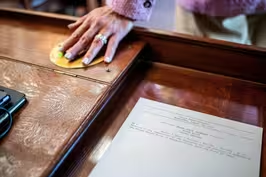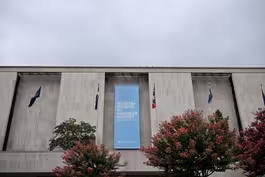
As vouchers expand, public districts fighting to hold on
Clip: 8/20/2025 | 6m 47sVideo has Closed Captions
As voucher programs expand, many public school districts are fighting to keep students
As states roll out or expand private school voucher programs, many public school districts are trying new ways to recruit families and keep their schools open. In Arizona, the national model for school vouchers, families can get up to $7,500 per child. But critics warn that it diverts critical funding from struggling schools. Geoff Bennett discussed more with Laura Meckler of The Washington Post.
Problems playing video? | Closed Captioning Feedback
Problems playing video? | Closed Captioning Feedback
Major corporate funding for the PBS News Hour is provided by BDO, BNSF, Consumer Cellular, American Cruise Lines, and Raymond James. Funding for the PBS NewsHour Weekend is provided by...

As vouchers expand, public districts fighting to hold on
Clip: 8/20/2025 | 6m 47sVideo has Closed Captions
As states roll out or expand private school voucher programs, many public school districts are trying new ways to recruit families and keep their schools open. In Arizona, the national model for school vouchers, families can get up to $7,500 per child. But critics warn that it diverts critical funding from struggling schools. Geoff Bennett discussed more with Laura Meckler of The Washington Post.
Problems playing video? | Closed Captioning Feedback
How to Watch PBS News Hour
PBS News Hour is available to stream on pbs.org and the free PBS App, available on iPhone, Apple TV, Android TV, Android smartphones, Amazon Fire TV, Amazon Fire Tablet, Roku, Samsung Smart TV, and Vizio.
Providing Support for PBS.org
Learn Moreabout PBS online sponsorshipGEOFF BENNETT: In recent years, two-thirds of America's public schools have lost students.
And now, as more states roll out or expand private school voucher programs, many public school districts are fighting to hold on, trying new ways to recruit families and keep their schools open.
In Arizona, the national model for school vouchers, families there typically get $7,500 per child through the state's fast-growing school choice program.
But critics warn those dollars come at a cost, diverting critical funding from already struggling public schools.
Laura Meckler is a national education reporter for The Washington Post.
She's been reporting on this and joins us now.
Laura, thanks for being with us.
So, since 2019, two-thirds of traditional public schools have lost students, lost enrollment, and that trend is accelerating?
I was shocked when I read that number.
What accounts for it?
LAURA MECKLER, The Washington Post: Well, there's a lot of things that are behind enrollment drops.
I mean, some of it's demographics in certain places, and some of it is school choice.
There are -- in certain states, in particular.
Arizona is definitely one of them, there is more and more competition for the same number of students.
GEOFF BENNETT: And your recent reporting focuses on Arizona, which has a number of alternative options.
They have a robust charter school system.
There's tax money for homeschooling, expansive private school vouchers, which are available to all families, regardless of income.
How does it all work?
LAURA MECKLER: Yes, I mean, there is really a philosophy underlying all of this, which is that schools should be subject to the same sort of marketplace forces that are at work when we're choosing other things that are important in our lives and that public schools should not have a monopoly on public funds or on students.
And so, in Arizona, they're really pushing this pretty far.
So there is a robust -- as you said, a robust charter school option.
And we kind of know how those work.
You can actually transfer to a different public school if you want to.
And there are also private school vouchers.
So the state will pay if you want to go to a private school or even if you want to homeschool your kids.
GEOFF BENNETT: Are these alternative options delivering results?
How do students in these schools compare to their peers in traditional public schools?
LAURA MECKLER: Well, we actually don't really know, because kids who are in private schools are not required to take the state tests that kids in public schools do and that we're all so familiar with.
I mean, there is a lot less accountability in this system.
The accountability is essentially the market that parents, if they're unhappy, they will change.
But we don't have that kind of robust data that we have that we use to compare one public school district to another.
GEOFF BENNETT: And what's it take for public schools to stay competitive in this kind of environment?
LAURA MECKLER: Well, they have to really go out there and sell themselves.
I mean, but it is hard for them, because they have to take everybody.
So kids who are really struggling, kids who don't do well in private schools, they might bounce back.
A lot of kids who have special needs are in the public schools, and they are required by law to educate them and to provide them with services.
But, yes, public schools are, of course, fighting back and they're talking about their strengths and what they offer to parents, to children, to the community as a whole.
So it's not like public schools are done with finding -- the vast majority of kids still do attend public schools.
There's no doubt about that.
But they are having to in, certain states, at least, really fight for those students.
GEOFF BENNETT: School choice is an initiative that President Trump has championed.
What does this tell you about how the GOP envisions the future of education in America?
LAURA MECKLER: I think it very much is this idea of a marketplace, that we should not just -- in fact, it's telling, for instance, if you talk to people who support school choice, they often refer to public schools as government schools, this idea that it's sort of a denigration of them.
I think -- I don't know if anyone here is government school and thinks, that sounds great.
They -- the idea that we have long sort of assumed that public schools are the public option.
They're the ones that get public money.
But the new philosophy is very much that, if it's tax dollars, that the parents should control that money and that, if they're unhappy, they should be allowed to go somewhere else.
I mean, part of the challenge, though, here is that many of the people who are benefiting from school vouchers in Arizona and elsewhere were people who are already in private schools.
So, in that case, it isn't so much taking away from the public schools, but it is a new expense for the state, who is paying money for those vouchers, when they weren't paying any money before, and that that has real budget implications.
GEOFF BENNETT: And we should say this is going to go national because there's a new federal tax credit that's set to take effect.
Is that right?
LAURA MECKLER: That's right.
This is a really big deal.
We have never had federal tax dollars going for school choice before.
But now, for the first time starting, in 2027, states will have the opportunity to opt into a new program where taxpayers will get a 100 percent tax credit.
They will get all their money back if they donate to something called scholarship granting organizations, which essentially hand out vouchers to kids in their states.
So this is going -- again, states have to opt.
In and for Republican states or states that already have these programs, it'll be an easy choice.
But for a lot of Democratic states that don't have these programs, this is going to be a real, real battle about whether they adopt this program.
GEOFF BENNETT: Let's shift our focus to Oklahoma, because Oklahoma, as you all know, they're requiring applicants for teacher jobs coming from California and New York to take a so-called America first test.
The state's top education official says it's designed to safeguard against -- quote -- "radical leftist ideology."
What more should we know about this?
LAURA MECKLER: Well, the first thing to keep in mind is the top state official, as you mentioned, Ryan Walters, is very much -- this is a very Ryan Waltersy sort of thing to do.
I think it's fair to say.
He's quite conservative.
He's on the forefront of the culture war issues.
And he's done things like try to require that the Bible be taught and try to make the state pay for Bibles for every student in the state, and only do it in a way that they would have to buy Trump Bibles.
He's done a lot of things along these lines.
So this is just sort of the latest.
I mean, one thing to keep in mind, and I don't know if this is going to fly, is his proposal is essentially that certified teachers have to take a test, a 50-question test.
And some of the questions are completely legitimate questions, to be clear, but they're only applying that to people coming from certain states.
I don't know if that's going to ultimately survive, if you say, oh, certain people, if you're coming from New York, you have to take this test, but if you're coming from Texas, you don't.
GEOFF BENNETT: Certainly more to come on that front.
Laura Meckler of The Washington Post, thanks, as always.
Good to see you.
LAURA MECKLER: Good to see you too.
As Russia wages war, NATO plans Ukraine's future defense
Video has Closed Captions
Clip: 8/20/2025 | 3m 39s | As Russia continues to wage war, NATO meets to plan Ukraine's future defense (3m 39s)
Expert analyzes difficulties of Ukraine security guarantees
Video has Closed Captions
Clip: 8/20/2025 | 5m 49s | Expert analyzes difficulties of providing Ukraine with security guarantees (5m 49s)
Florida’s climate tech sector faces uncertainty after cuts
Video has Closed Captions
Clip: 8/20/2025 | 8m 39s | Florida’s climate-focused tech sector faces uncertainty after federal cuts (8m 39s)
How marijuana reclassification could impact users, research
Video has Closed Captions
Clip: 8/20/2025 | 6m 29s | How the reclassification of marijuana could impact users, businesses and research (6m 29s)
News Wrap: Texas closer to approving new congressional maps
Video has Closed Captions
Clip: 8/20/2025 | 8m 34s | News Wrap: Texas lawmakers move closer to approving new congressional maps (8m 34s)
Scholar responds to Trump's efforts to reframe U.S. history
Video has Closed Captions
Clip: 8/20/2025 | 7m 10s | Scholar says Trump's efforts to reframe U.S. history is 'reminiscent of McCarthyism' (7m 10s)
Why the AAP is diverging from CDC vaccine guidelines
Video has Closed Captions
Clip: 8/20/2025 | 5m 55s | Why the American Academy of Pediatrics is diverging from CDC vaccine guidelines (5m 55s)
Providing Support for PBS.org
Learn Moreabout PBS online sponsorshipSupport for PBS provided by:
Major corporate funding for the PBS News Hour is provided by BDO, BNSF, Consumer Cellular, American Cruise Lines, and Raymond James. Funding for the PBS NewsHour Weekend is provided by...


















